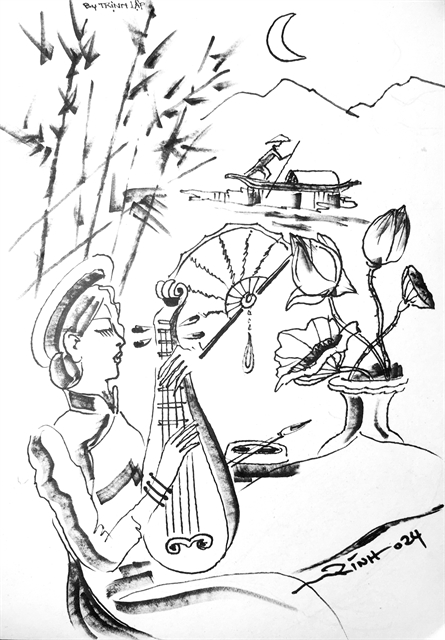 Talk Around Town
Talk Around Town

 |
| Illustration by Trịnh Lập |
by Nguyễn Mỹ Hà
In the spirit of International Women's Day, May 8, women around the world get to be talked about a bit more than usual.
Let's talk about Hồng Hà Nữ Sỹ, the new film built on the life and talent of Lady Đoàn Thị Điểm, pen-name Hồng Hà nữ sỹ in the 18th century, hence the film's title.
A young woman of exceptional talent in poetry and a natural beauty, she lived in the 18th century. It was a time of continuous political power wrestling, where the only way to rise to the rank of the royal court was to take the imperial exams.
Only after having passed them, would the examinees be assigned an administrative posting, then start to work. Only men could sit these exams, with women not allowed.
At the tender age of 16, she was adopted by the then Prime Minister of the royal Lê court, to be later presented to the ruling king. To the surprise of everyone in the mandarin's family, Điểm refused.
As the only daughter of a scholar, her father taught his children, a boy and a girl Han Chinese and Vietnamese ideographic Nôm scripts, even though women were not allowed to take the royal exams.
The Han Chinese language is a system of hieroglyphs, which encompasses many layers of meaning, thus making poetry in Han Chinese sophisticated, difficult to decipher, and having multiple meanings.
During that time, when women didn't get to sit the royal exams, Điểm's family didn't let her stray and become illiterate. She was well-versed in both Han and Nôm scripts, and what set her apart from others was her ability to counter a sentence or poetry line given to challenge her knowledge and understanding.
The film's setting and costumes are mysterious and set in a distant time, where we either know little or next to nothing, as we do not understand Han or Nôm script.
The poet's reputation was known in the neighbourhood for her ability to respond perfectly to a poetic parallel sentence. Her legendary response to counter a poetic line was trained with her brother. This shows us that even when society was against women, a family could still empower a daughter by teaching her to read and write, helping her to be financially independent.
Many years of war and the arrival of Western missionaries saw a shift from only using Han and Nôm scripts to using a Latin alphabet, which not only switched off the ties with the past but hindered the teaching and understanding of ancient Vietnamese literature, as teachers no longer knew the original script the work was written in.
I have started to see a huge void and an immense loss of ties, traditions, and customs from the past. Especially when you enter a pagoda to pay respects to the Buddha, village patron saints, and other historic figures, you feel aghast that you cannot read the Han scripts on the horizontal wooden board or the two parallel sentences. Even more frightening is that some tourists standing next to me in front of the altar could read and understand exactly what had been written hundreds of years ago.
The current minister of education has a linguistic background and studied Han Chinese language as his expertise. A ministerial decision issued in 2021 made the Chinese language a subject for students to learn from Grade 3 to 12 across the country. The regulation was made so that by teaching students Han Chinese, they could have an idea of what life is like today in China or in other countries that use the language.
The great-grandson of famous scholar and poet Nguyễn Khuyến recently announced that some schools' teaching of his ancestor's poems were not correct. He deciphered the wording in Han Chinese, thus explaining what the writer, his great-grandfather, was trying to say.
Knowing what's going on in the world in Chinese-speaking countries can be very interesting, but using linguistic skills to get back to our roots is perhaps more critical, helping us secure our ties with our past.
I am ashamed to say that most of the poems I heard in the film I was previously unaware of. We needed to read subtitles in Vietnamese instead of English. All the linguistic and poetic beauty of her works were somehow lost in translation.
The film has caught on the trend to look back into history and try to grasp what our ancestors' lives were like.
Today in the walking streets of Hà Nội, Hồ Chí Minh City or Huế, Hội An, you can see many young beauties clad in ancient-style costumes, drawing looks like pretty magnets.
Though the film was not thrilling entertainment, it was food for thought for our souls, for my soul. As we went home, we wanted to read more about Đoàn Thị Điểm's poetry, to dig up the milestones of her life and work.
In school textbooks, she is most renowned for having translated Đặng Trần Côn's epic poem Chinh Phụ Ngâm (Lament of the Soldier's Wife) in Han Chinese into Vietnamese Nôm script.
Thanks to her father for being a great scholar, maintaining the family's teaching tradition, she was able to have and leave a legacy of literacy and literature. VNS




